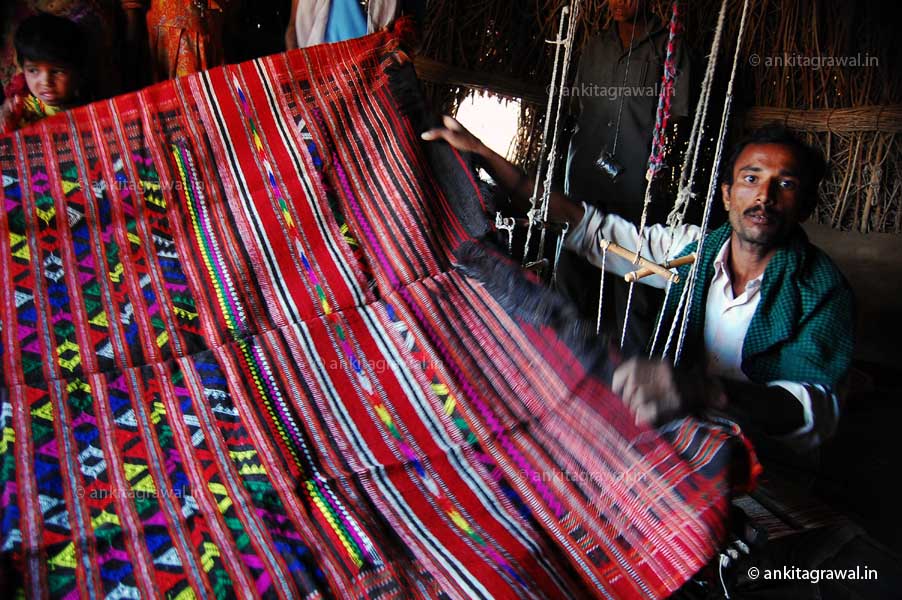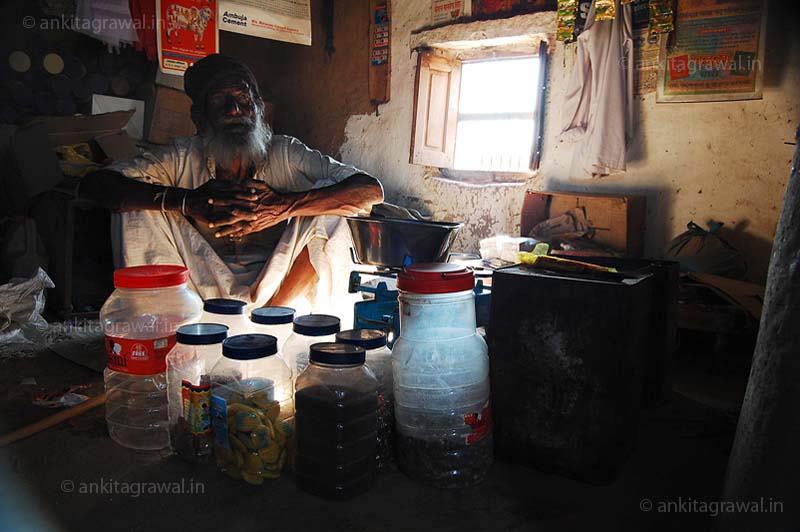Stories from Lakharwara Ki Dhani
Condition of handicraft workers

Ramarao showing kambal pattu
Ramarao comes from family which has been weaving for the past six generations. Besides weaving, he farms during the monsoon season and is a seasonal migrant labourer to Gujarat during summer. Ramarao weaves kambal pattu (thick weaved shawl) in winters. He still uses handmade spinning wheel (Charkha) for spinning. It takes him around 10 days to prepare a blau patti(thick quilt) worth Rs. 2000. Ramarao’s business thrives during winter, partly because of cold and increased purchasing power of villagers due to crop selling.
While weaving kambal pattu, Ramarao suddenly recalls old memories and declares that gone are the days, when his father’s pattu used to sell in the shops of Chouhtan and Gaddra. Now nobody in town buys their work. He sarcastically adds to it saying, “Now there is some other design popular in the market”
Every year during summer, Ramarao goes to nearby metros like Amdavad, Gandhidham or Kandla in Gujarat for labor work. He prefers labor and masonry over NREGA because he claims to comfortably earn around 6000 per month while shuttling between all his jobs and living in big cities. But living in big cities comes with both positive and negative effects. One of the most positive impacts of city life is that Ramarao advocates for small family and higher education of his only child who is girl. He proudly cuddles his three year old daughter and says “I will educate my daughter till the end of my means of mine… I want her to become a government officer so that we can start living comfortably there.” After spending nearly three months every year and weaving dreams of better life in city, Ramarao cannot quickly adjust back to his rural life nor can he afford to settle in the big cities.
Ramarao has no option but to live with this problem as he neither gets any government support and NGO support to do weaving in village nor he can migrate permanently to one of above mentioned metro cities. Government and NGOs don’t have any scheme to financially assist Ramarao and others like him. Mahesh Panpaliya, founder of Barmer based NGO Dhara says “Government must include local handicraft as a part of NREGA.” The only time his art was recognized by government was seven years ago, when one government official (Ramarao forgot officers name) felicitated him by giving a piece of shawl. NGOs like SURE which gives loan to farmers, and shopkeepers also does not have any scheme for assisting in production and marketing of the rich handicraft tradition of Lakharwara Ki Dhani. The craft of not only weavers but also cobbler, embroidery working families entirely depends on demand, which in turn is seasonal and not always sure.
The introduction of factory made cheap products has created further hurdles for these workers. Kumbha Ram, a cobbler says, “We take three days to prepare one embroidered jutiworth Rs 300 but now people buy plastic sandal at just Rs 100.” The desperation for leaving current profession is so high that Nagaram, a cobbler roars “I don’t care who will make jutisbut I dont want my children
to continue working as cobbler.”
Clearly, everyone of the above still do their traditional work but not because they love doing it, but because they have no other alternative.
A village in the middle of desert without any ship..
Two years ago, Nagaram sold his camel for Rs 25,000 to buy food for his family and to provide for his younger son’s education. Nagaram is not the only one who has had to sell his camel. This is a common story in Lakharwara ki dhani, a village just 10 km away from the prosperous Chouhtan town of Barmer district in western Rajasthan.
Lakharwara ki dhani is a Meghwal dominated settlement of 25 families, situated on the main road leading to Barmer. Until five years ago, there were 20 camels in the village but acute water shortage owing to continuous drought and nearly five times rise in the cost of toola (camel food) has led to the camel selling. Nagaram tells that today per day diet of camel costs around Rs. 125 which is much more than the daily earnings.
Villagers sold their camel at the yearly Durmina festival, celebrated for Yog Maya. Veracity of this fact was seen in this year’s Pushkar Fair, where many camel sellers were reluctant to take their unsold camels back.
Udaram Panna, an official of Barmer based Non governmental Organization SURE (Society of Upliftment of Rural Economy) which gives micro credit for buying cattle, says that in last few years applicants for buying camels has declined in this region.
Microcredit: way to Rural Upliftment?

Lumba Ram at his shop
Ninety year old, Lumba Ram is patiently waiting for customers in his shop. After some time Kailash, an eight year old boy comes to buy unpacked tobacco, two packets of beedi and matchstick for her father. But boy has to take less beedi because he less money to pay for it. Lumba Ram says to child “I have stopped giving things in credit.”
Few years back Lumba Ram was broke by drought as it defaulted most of his customers simultaneously. He became dependent on his son Amra Ram’s family, which does embroidery work. Last year he applied to shopkeeper’s financial assistance scheme from Chouhtan based NGO- SURE, he got Rs 10,000 immediately. Money had to be paid back in 10 installments without any interest. Lumba Ram returned this money within the stipulated time and he accepts that the NGO was very helpful in establishing his shop again. Today Lumba Ram earns around 3000 a month and caters the need of not only his village but also some dhani’s surrounding it. SURE’s official Udharam Panna proudly says that after consulting Dalit Jaagruk Samiti of the village, they built water tanks, gave Rs. 1000 for farming in the monsoon season and gave loans for reviving shop or buying cattle like goat and camel. Udharam calls this their endeavors towards upliftment of rural economy.
Everyone living in this village performs many jobs to earn bread for family. People living here are farmer, daily wage laborers and handicraft workers at different month of the year. Conditions are so unfavorable that people cannot do any single work for more than 3 months. NGO’s and government must try to increase purchasing power parity of public in general and not only of shopkeepers.
First published in ACJ Newsline in 2010.
No Response to “Stories from Lakharwara Ki Dhani”